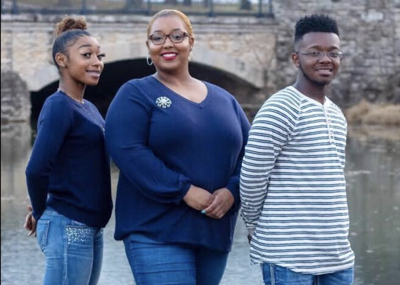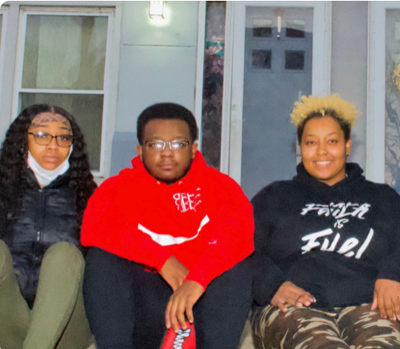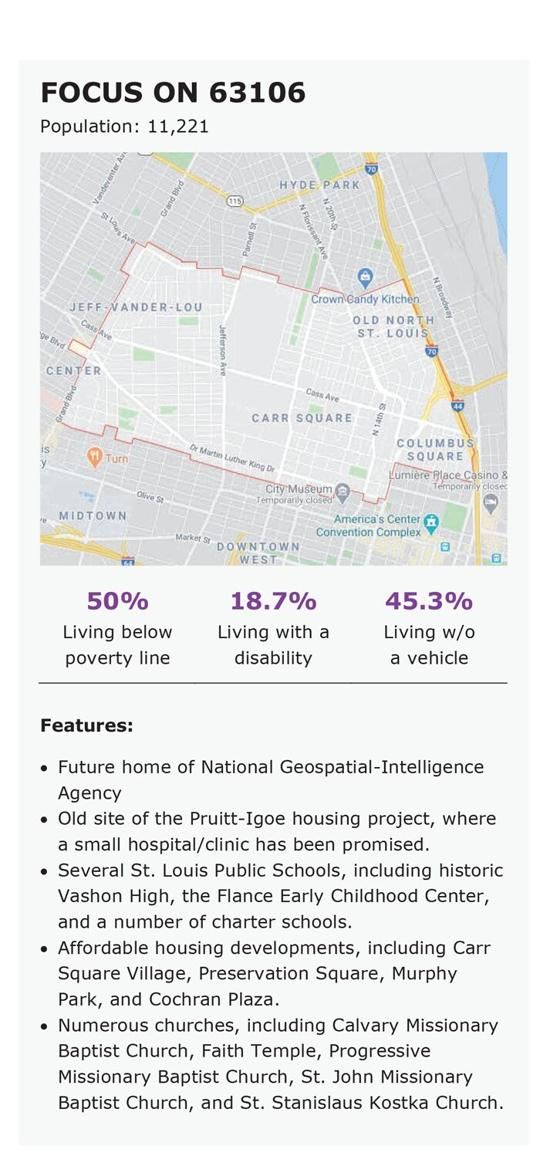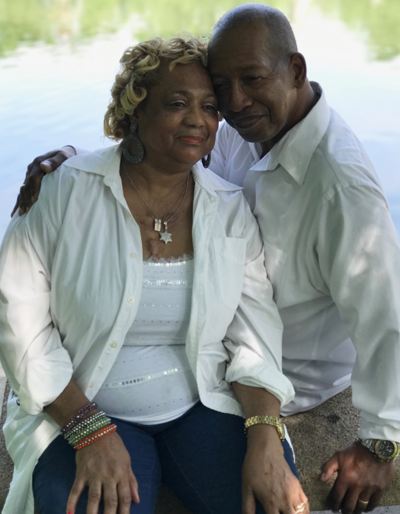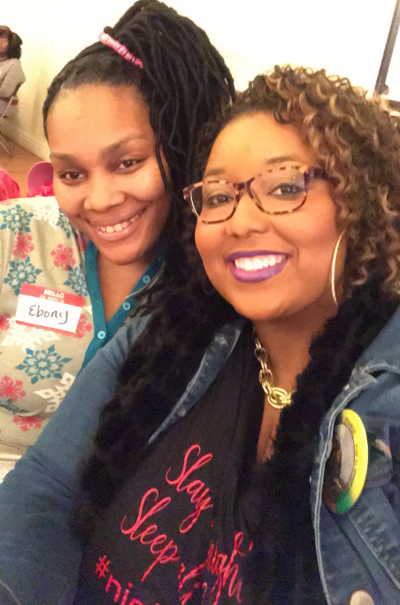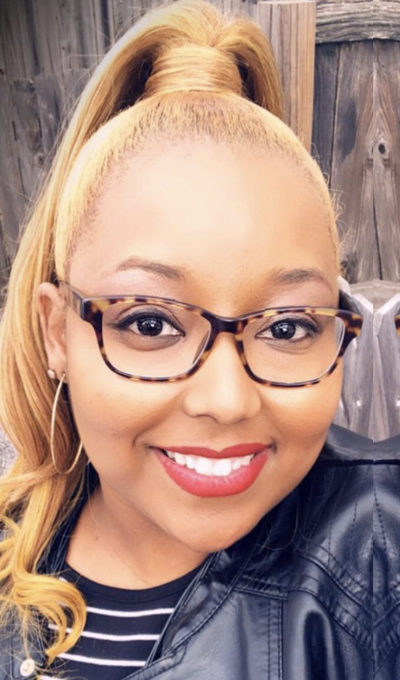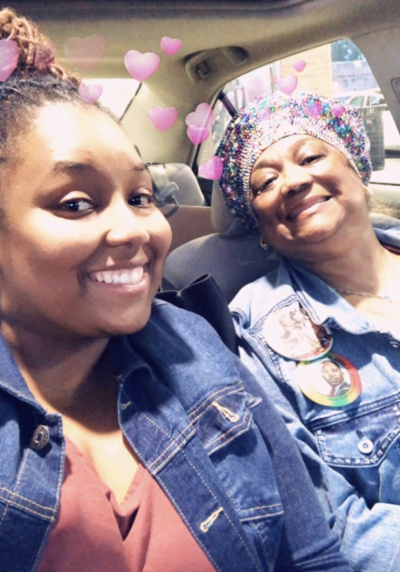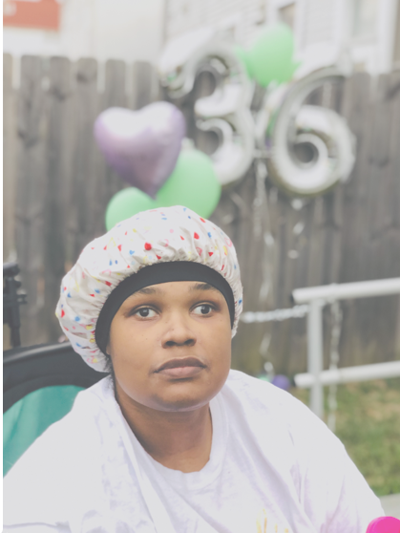On a frigid evening in January 2019, Misha Marshall set out to Missouri Baptist Hospital in west St. Louis County to work a 12-hour night shift as a registered medical assistant. On a normal day, the trip from Misha’s home in the Columbus Square neighborhood just north of downtown would usually take no more than 30 minutes and she usually drives.
But on this evening Misha was looking at a massive storm that would drop eight inches of snow across the region. With an abundance of caution, she tapped an app on her phone to hail an Uber. As Misha and her Uber driver neared the hospital, they encountered a stalled car blocking traffic on Ballas Road. Misha saw an elderly woman inside looking panicked as other motorists grew impatient and began honking their horns.
Misha mentally shifted into caregiver mode and asked her driver to stop. Braving the elements, she got out of the car, tapped on the woman’s window, and said she would try to help. Misha decided the disabled car simply needed a push to put the driver on her way. But as she worked her way to the back of the car, Misha slipped. As she remembered the moment in a recent interview, “I was like, ‘Oh my God, my leg is broken’ and I am lying in the middle of Ballas Road.”
The Uber driver managed to get Misha back in the car and complete the drive to Missouri Baptist, where X-rays confirmed that Misha had suffered a break in two places in her leg, along with a dislocated ankle.
“From that one night, I was out of work for five months,” Misha recalled. “I was supposed to be living my best life. And here I am, lying in the street with ice and thinking, ‘Don’t help nobody no more.’”
Of course, that’s never going to happen. As a healthcare professional, primary caretaker of her sister, and a guiding hand in the lives of her elderly parents and two children, Misha has focused her life on helping others. “Anyone that I have had a hand in caring for, I’ve done it to the best of my ability as well as with compassion and care for that person,” she says.
Fragile life in a vulnerable neighborhood
Misha Marshall and her family live in a neighborhood that has long been in need of compassion and care. The Marshalls live in ZIP code 63106, which has become iconic in this region and not in a good way.
Researchers at Washington and St. Louis universities in a widely cited study have identified 63106 as the region’s most vulnerable when it comes to the social determinants of health.
Lots of data go into that assessment, but here’s one way it boils down. A child born in 63106 in 2010 had a life expectancy of 67; a child born in 63105, just six miles away in suburban Clayton, could expect to live to age 85. An 18-year differential. And this was before the pandemic.
The Marshall family’s story is part of the 63106 Project, organized by Before Ferguson Beyond Ferguson, a non-profit racial equity storytelling collaborative that provides stories to St. Louis media about the region’s most vulnerable residents in the time of the pandemic. Eight families in 63106 have participated in the project to date. As part of this effort, the Jewish Light will follow the Marshall family throughout the pandemic, providing new chapters as circumstances dictate through 2021.
Misha’s parents, John and Cathy Marshall, are seniors, ages 76 and 74. Cathy is dealing with heart disease, John is diabetic, and Misha’s sister, Maya, has a congenital brain disorder. So they may be more vulnerable than most to COVID-19 and the havoc it leaves in its wake.
Add to all this, a cousin, Ebony, 37, another resident of 63106, who underwent a heart transplant and more recently another open-heart surgery. Misha has been taking Ebony to her doctor appointments and picking up her 4-year-old son, Clayton, at daycare. “So my day has not been my day for at least the past month or more,” Misha sighs. “It’s a lot to take in.”
Vulnerable as they may be, the Marshalls stay on an even keel.
Misha lives in Columbus Square with John, Cathy and Maya, as well as her two children, Maleah and Jacobi.
John made his living working at a union job as a chemical operator, first at a Monsanto plant in Soulard, then in the 1990s moving over to the other side of downtown to Mallinckrodt Chemical Co.’s plant at 3600 North Second Street.
That’s when John went looking for a home nearby and came across two side-by-side townhomes on Hadley Street in Columbus Square about 2½ miles from the plant. John took out a mortgage, bought the units, and later renovated and combined them into a single home that is two stories with five bedrooms and three-and-a-half bathrooms.
The Marshalls are among just a very few homeowners in 63106. Census figures from 2018 show that only 16% of residents within the ZIP code owned their residence. (That compares to an average of 69% across the metropolitan area.)
That they could qualify for a loan to buy the home might be considered a minor miracle, given the redlining practices among lenders that have persisted for decades right up to this day as a Post-Dispatch report revealed in 2018. In neighborhoods north of Delmar, the newspaper reported “no matter the credit history of the applicant, getting a mortgage loan or refinancing a mortgage is time-consuming, difficult, or altogether impossible.”
John and Cathy liked their new neighborhood, settled in and updated and renovated their unit to accommodate their family’s special needs.
‘Mama Misha’
Misha says her parents raised her with a deep and abiding faith, so much so that Misha reads a Bible verse or more every day. John served as a deacon at Mount Zion Missionary Baptist Church, 1444 South Compton Avenue, and Cathy got involved in the church’s many ministries. “I did all kinds of youth drama ministries and whatever ministry they had in church,” Misha recalled. “I’m just a person that loves God, knows that there is a God, I pray to my God, the God that I serve.” She is now a member of Friendly Temple Missionary Baptist Church, at 5515 Martin Luther King Drive.
Misha attended St. Louis public schools and graduated from Roosevelt High School class of 2001. She started working toward a degree in business administration, first at Forest Park Community College, then at Lindenwood University and Fontbonne University. But her efforts at continuing her education, now focused on healthcare, have run into a series of interruptions with a succession of health issues involving her sister, her mother, her own broken leg, and now her cousin.
None of this surprises Dr. Cassandra Pruitt, a pediatrician at the Washington University School of Medicine, where Misha worked as a medical assistant in an outpatient pediatric clinic at Children’s Hospital.
Pruitt said Misha frequently went above and beyond to help her patients. “I called her mama Misha because she wants to be everyone’s mama. She would take our patients under her wing and help them and their parents. And she could really relate because of how she takes care of her sister and parents at home.
“I still feel Misha has so much more to give. She needs to take time for herself to go to nursing school and become a nurse and have recognition for the work that she does.”
Just as Misha’s parents taught her the importance of kindness and family, Misha does the same for her kids. Maleah and Jacobi have been helping around the house from an early age. When they were just 3 years old, they began aiding their mother in caring for their aunt Maya, who has cerebral palsy.
Each time they saw Misha head towards Maya’s room, they knew it was time to provide her with some TLC. Over time, the two kids learned to grab wipes and other supplies to help keep their aunt clean. As youngsters, they viewed pushing around Maya in her wheelchair as a fun game. Today, it is a normal and welcome part of their day. “They know that she has to be fed and dressed and groomed and all these things that you’re supposed to do with a person that is of diminished capacity,” Misha said. “So it’s not something that is out of the norm for them.”
Apart from taking care of their aunt Maya, Maleah and Jacobi help Misha in other ways around the house. Maleah often helps her aging grandmother enter the bath. If the kids notice that Misha looks more tired than usual, they make sure she does not have too much work to do around the house. They often come together to wash dishes and cook dinner for Misha.
One day in particular, Jacobi noticed that Misha was having an especially difficult time. She was not in her normal optimistic mood and accidentally had left her phone at home. Knowing that not having her phone would make Misha’s bad day even worse, Jacobi took an Uber to Misha’s work to surprise her with the phone. As he handed his mom the phone, he left her with words of affirmation: “Mom, everything’s going to be OK. You have to remember to have hope or be hopeful. You have to be hopeful.”
Trying always to stay positive, Misha tries not to think too much about the crime in her neighborhood. The 63106 ZIP code incorporates several St. Louis neighborhoods, including along with Columbus Square, Jeff-Vander-Lou, Old North and Carr Square. According to data from the St. Louis Metropolitan Police Department up to October 2020, these neighborhoods had reported 24 homicides, nine rapes, 108 robberies and 306 aggravated assaults for the year. The homicide rate is 200 homicides per 100,000 people for 2020. By comparison in 2018, the city of St. Louis overall reported 60.9 homicides per 100,000 people.
St. Louis police crime data also shows aggravated assaults in 63106 have increased 30% in the period since COVID-19.
Still, Misha says her family feels safe in their immediate neighborhood, though she stays alert. “I’m aware of my surroundings,” she said. “Am I gonna just be riding around with my windows down and my car unlocked at 2 o’clock in the morning? Absolutely not.”
The pandemic struck as Misha had just gotten back on her feet. She works now on private duty for physicians in their offices and also performs outreach to patients by phone.
Learning 'to be people again'
In late August, Misha celebrated Maya’s 36th birthday with the help of her kids, parents, and her older sister and her family. Because of the struggle it takes to place Maya in her wheelchair, she does not often get the chance to spend time outside. The celebration and opportunity for Maya to enjoy fresh air meant a lot to everyone in the family.
Despite all the challenges her family has faced, Misha, ever optimistic, says the pandemic “has brought people together more. It has made people realize that life is too short, and not to dwell on small things. It’s taught people to love more. It’s taught people to be more accountable, be present, because the person that they are talking to might be here today, but they might not be here the next day.
“It’s made people learn to be people again.”
Leyla Fern King is one of several storytellers for Before Ferguson Beyond Ferguson, a non-profit racial equity storytelling project. She is a senior at John Burroughs School, and an alumna of Cultural Leadership, a St. Louis-based program that brings together Jewish and African American students to learn about and address systems of oppression through the study of African American and Jewish history. Leyla’s opinion columns have been published in both the St. Louis Jewish Light and the St. Louis American, and have been reprinted in Black newspapers nationwide.
